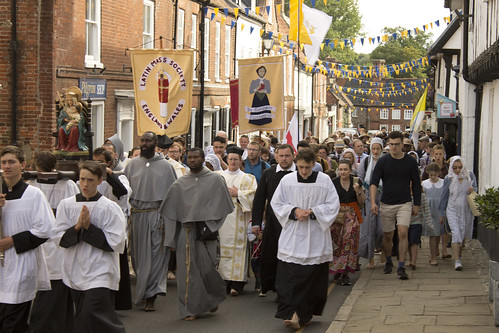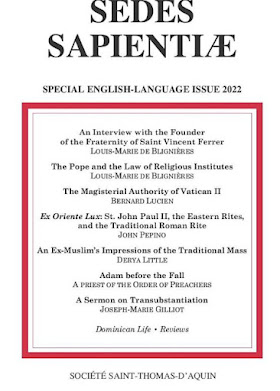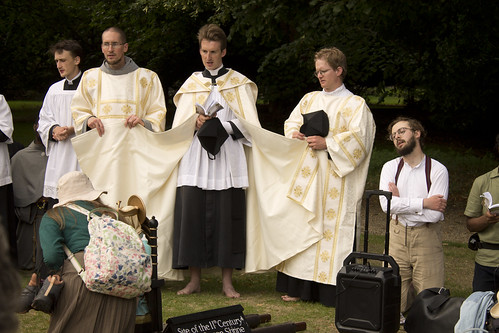Friday, September 30, 2022
Home Education meeting in Reading Saturday 1st October
Thursday, September 29, 2022
A Muslim convert encounters the Traditional Mass
When I attended my first traditional Latin Mass years later [after her conversion, first to Protestantism and then to Catholicism] in an old English church with dark walnut pews, that reverence I had experienced during my very first Mass reached a new height where the reason for those tedious [Old Testament] details about worship became clear. This was a God before whom I could kneel; a God who held our existence in his hands, yet chose to humble Himself to become one of us and suffer humiliation and death in love to save us from our own sinfulness.
Thursday, September 22, 2022
The Royal Prerogatives and the law: 1Peter 5 by James Bogle
Saturday, September 17, 2022
Indifferentism and Praying for the Queen and the King
Protestant Traditionalists: Letters in The Tablet
 |
| LMS Walking Pilgrimage to Walsingham this year |
Friday, September 16, 2022
Launch of Family & Life Academy
Voice of the Family.
Some readers may know Voice of the Family through their magazine Calx Mariae.
The Academy lets you watch courses of weekly lectures at a very affordable price, either live or recorded, plus free webinars on various subjects. There are courses on Natural Law (from me), Divine Law (from Fr Thomas Crean), the moral issue of abortion (from the veteran pro-life activist John Smeaton). There will be special appearances by His Excellency Eduard von Habsburg and Roberto Mattei.
Here is their announcement with more details and links.
Thursday, September 15, 2022
King and Father as Sacred Offices: from the European Conservative
Perhaps the Queen’s most remarkable achievement is that, by accepting this [her role] so absolutely, she has gained a deeper fulfilment than if she had rebelled. She has become what she has tried to be. People who know her well say there is always an air of peace surrounding her. To use a phrase below the level of events, she has job satisfaction.
This echos the position of the philosopher Byung Shul Han, whose most recent book, The Disappearance of Rituals, I reviewed in The European Conservative. We do not lose our freedom by identifying with our social roles, as Romantics and Existentialists would have us believe, but gain it. As the phenomenon of social media has underlined, the effort to be ‘authentic,’ to create oneself anew at every moment, is an exhausting exercise of play-acting, a confidence-trick one plays on oneself and one’s most intimate friends, which today is packaged and sold as click-bait for advertisers. By contrast, from the stable platform, as one might call it, of a conventional role, one can be playful and creative: have the Romantics and Existentialists not noticed that play and art are themselves conventions? Without the conventions of language, there can be no satire. Without the conventions of religion, there cannot even be blasphemy. The brilliant self-defining act of the Romantic or Existentialist, without the background conventions of the societies in which these theories developed, would be completely lacking in meaning. They would communicate nothing.
Read the whole thing there.
Tuesday, September 13, 2022
Two pieces on the Monarchy
 |
| Queen Elizabeth II at her coronation in 1953 |
Monday, September 12, 2022
Latin Mass Society: new office!
Our new address is:
Website, email, and phone number all remain the same.
Friday, September 09, 2022
Prayer for King Charles, after Sunday Traditional Mass
Thursday, September 08, 2022
No, the answer is not 1965, Fr Somerville-Knapman
Cardinal Roche seems to require that the Church deny herself, and to employ her authority today to negate her authority in former days. Many will echo Benedict XVI in asking how what was holy yesterday—and indeed for preceding centuries—can suddenly be a danger to faith and the Church today. Rome is making a serious mistake in its programme to shore up the practical reception of the reformed liturgy, and in so doing is backing itself into a corner.
The liturgical reforms were expressly pastoral, intended to increase congregational participation. The severe decline in the numbers in congregations since the promulgation of the reformed liturgy over 50 years ago suggests that the reforms have not achieved their purpose. Equating the reformed liturgy—which I celebrate, but which for all its virtues has failed in its purpose—with the will of Vatican II leads logically to the conclusion that the failure is the Council’s when in fact it is the Consilium’s.
Wednesday, September 07, 2022
Fr Gwilym Evans FSSP: Mass in Cardiff 17th Sept
Thursday, September 01, 2022
LMS Walsingham Pilgrimage: photos
 |
| Approaching the Priory grounds at the end of the Holy Mile. |
 |
| Mass in Cambridge on Thursday morning for the three pilgrims trying out an extra leg of the walk: another 18.4 miles, to Ely |








